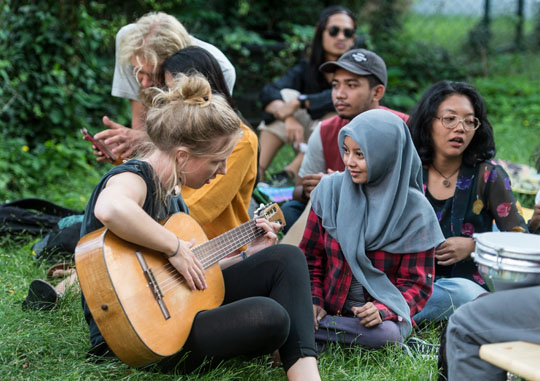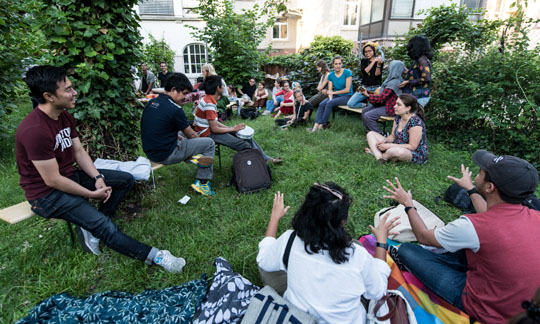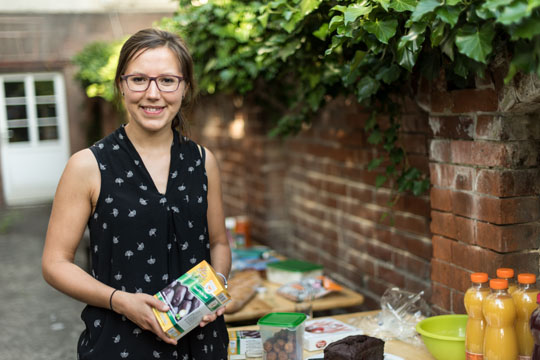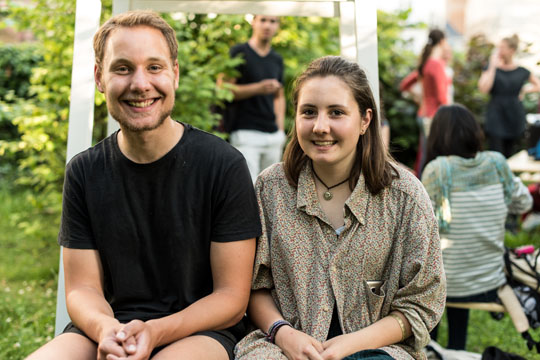Making music together, learning from one another
Freiburg, Jun 20, 2017
University instructor Mirjam Lücking offers practical learning experiences to participants in her seminar on popular Islamic cultures: Students made music together with guests from Indonesia, Syria, Algeria and other Islamic nations in the garden behind the Freiburg Institute of Ethnology. The jam session and conversations shortened the waiting time before they could break their fast during Ramadan – and delivered insights into other cultures.
 A jam session makes Islamic music tangible for ethnology students.
A jam session makes Islamic music tangible for ethnology students.
Photo: Patrick Seeger
The sun is hanging low in the sky. Its rays are bathing the garden behind the Institute for Ethnology in a soft light. A lot of people chatting amidst the cherry tree and the hazel yearned for this very moment. Fasting during Ramadan ends after sundown for Muslims. Although about a third of the fifty guests are members of other religions, they all wanted to enjoy their first bite of the day together. A table is lavishly set a few meters away: Falafel, tabouleh, chickpea and olive salad, bread, börek, chocolate cake...The anticipation mounts. Restlessness starts to show. A student from Indonesia rises and begins to sing the azan prayer call in a melodious recitative to introduce the breaking of the fast. Numerous conversations halt. Everyone listens intently. Even the hunger pangs are forgotten for a moment.
 Around fifty guests celebrated breaking the fast in the garden behind the Institute of Ethnology.
Around fifty guests celebrated breaking the fast in the garden behind the Institute of Ethnology.
Photo: Patrick Seeger
Experiencing cultures first-hand beyond textbook learning
"Such events belong to the practical side of instruction," explains university instructor Mirjam Lücking. She has just completed her doctoral thesis at Freiburg's Institute for Ethnology. Ethnology deals with every day realities of life. Along with the theory, instruction and research should also offer practical access to it, says Lücking: "We rely on experience-based learning. Students shouldn't just talk about people from different cultures. They should talk with them too." How does every day life look elsewhere? What do other people do and what motivates them? Ethnology students should experience it first-hand as it says in the literature. "That's why we encourage our students to learn outside the seminar classroom," says Lücking. Today's focus is breaking of the fast during Ramadan and popular Islamic music. Lücking organized the event with participants from her seminar on popular Islamic cultures. A jam session is intended to shorten the waiting time before sundown.
 Instructor Mirjam Lücking wants to offer her students practical access to everyday realities of life in other cultures. For that reason she organized a buffet, for instance, to break the fast together.
Instructor Mirjam Lücking wants to offer her students practical access to everyday realities of life in other cultures. For that reason she organized a buffet, for instance, to break the fast together.
Photo: Patrick Seeger
"I am really hungry," admits seminar participant Anton Legge before the event as he nibbles on a piece of pita bread. He is looking forward to the food, music and dancing: "Above all, I would like to communicate with people whose culture I know nothing about." Isabella Graf is currently participating in a German-Indonesian training research program at the Institute of Ethnology: "I have an Indonesian tandem partner with whom I will conduct research for the next four weeks." For the past fifteen years, this kind of exchange has taken place between ethnology institutes from two Indonesian universities and the University of Freiburg. It is important to Graf that everyone engages in good conversations with one another: "I would like for the twenty Indonesian students to be well integrated." Guests from other nationalities are equally welcome. Lücking and her seminar participants invited them through the Freiburg Islamic Center and the NGO "Start with a Friend."
 Interested in other cultures: Anton Legge is participating in a seminar on popular Islamic cultures, Isabella Graf is conducting research together with a tandem partner from Indonesia.
Interested in other cultures: Anton Legge is participating in a seminar on popular Islamic cultures, Isabella Graf is conducting research together with a tandem partner from Indonesia.
Photo: Patrick Seeger
The musicians come together more and more
The jam session starts off tentatively. Slowly, but surely the music starts to span across the meadow behind the ethnological institute. "Some of them are shy," says Lücking. The university instructor wants to offer other links besides music. That is why she distributes slips of paper with questions about fasting for Christians and Muslims: Are there any typical kinds of dishes during Ramadan? Which story about fasting is behind maultaschen (rolled meat raviolis)? The questions are intended to foster intercultural and personal exchange. Lücking passes them around: "You could take a playful approach. The challenge is to find someone here who can answer your question. "The slips of paper weren't necessary to start a conversation: people have been talking from the beginning. The guests from Indonesia, Algeria, Syria and Germany are chatting animatedly amongst one another. The constellation of the little groups is constantly changing.
Even the music has now developed its own dynamic: more and more musicians have started to come together. A little strumming grows into a full-blown song until the international songs and Islamic pop music blend into one another almost without pause. As modern times dictate, smartphones support the musical exchange: a lot of the singers are reading texts from the screen. That was arranged ahead of time in the event the visitors didn't really have the desire or courage to make music. Lücking's seminar participants had put together a playlist with favorite hits from the Islamic world. Barely a single one is played: the group of people who want to make music starts to grow even more. Later on they even run out of instruments for all the people who want to play along. The enthusiasm grows so much that the event hosts have to take measures to silence the sound by bidding their guests farewell with mild insistence.
"I have never heard such a thing"
"I really liked it – a wonderful campaign," says Isabella Graf. Everyone had either participated, had a chat or sung. Everyone had a free and easy conversation with someone else: "I learned a lot about Islamic cultures." The sung prayer call impressed her the most. Before that evening, Isabella Graf had believed that such hymns were private and not to be shared with people of a different faith. Anton Legge was also pleased with the evening and the prayer hymns: "I have never heard such a thing." No one danced in the end. And the playlist he had looked forward to hearing fell to the wayside. The food made up for it thought – "Great stuff, totally delicious!" – and the conversations: "I had a lot of great chats. There were a lot of commonalities for which we created the perfect framework." Mirjam Lücking is naturally happy about all the praise. The evening was a perfect combination of learning and fun. The two students and their instructor agree: events like this one call for an encore.
Jürgen Schickinger

